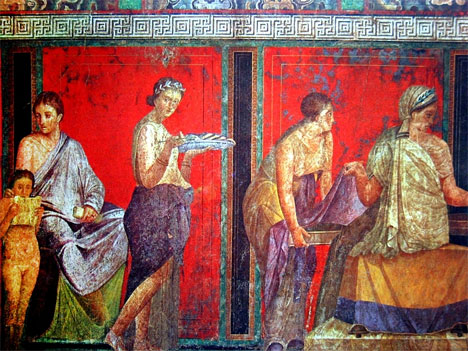True Glory
Paul understood God’s ways. God’s ways are “Covenant-shaped,” they concern transformation, and the glory always comes at the end. It is the result of God’s Word going out and coming back with something good, His own goodness multiplied.
Paul understood God’s ways. God’s ways are “Covenant-shaped,” they concern transformation, and the glory always comes at the end. It is the result of God’s Word going out and coming back with something good, His own goodness multiplied.
The history of mankind is one of good gifts turned into idols. Blessings abused become curses in the hands of those who won’t look God in the eye.
For those of us who know the Bible, the idolatries become more subtle. This was the case for the Pharisees. The exile had purified Israel of old-school idolatry, so she invented a new school: an elitism bound by an Abrahamic heritage and energized by the abuse of Moses and the Law as a means of salvation: heritage instead of faith; obligation instead of salvation. The good things given as gifts once again became the gods.
God loves His architecture. The first chapter of the Bible is architecture. The books of Moses and the book of Revelation are filled with architecture, and the same floorplan underlies every book in between. Most Christians don’t understand the Bible’s architecture and modern Christians not only do not understand it, they do not care for it. But God loves His architecture. To love the Bible one must love its architecture. To understand the Bible, one must let the architecture inform one’s understanding.
“A stone would be rejected by builders because it was ‘unhewn,’ like an Altar stone. But priestly submission was the only possible foundation for the perfectly chiseled stones of Israel’s temples, including the one still taking shape as Jesus spoke these words.”
The third cycle moves us from the “Exodus” of Jesus and His ministry to the threshing of Israel under His new Law. His growing influence among the people (Hierarchy) brings Him into conflict with the authorities (Ethics).
[A guest post by Chris Wooldridge]
“Woe to you, Chorazin! Woe to you, Bethsaida! For if the mighty works done in you had been done in Tyre and Sidon, they would have repented long ago in sackcloth and ashes. But I tell you, it will be more bearable on the day of judgment for Tyre and Sidon than for you. And you, Capernaum, will you be exalted to heaven? You will be brought down to Hades. For if the mighty works done in you had been done in Sodom, it would have remained until this day. But I tell you that it will be more tolerable on the day of judgment for the land of Sodom than for you.” (Matthew 11:21-24)
If we are paying careful attention to the historical context of this passage, it should be clear enough that the “day of judgment” referred to was fulfilled in the Jewish war of 66-70 AD. But why then does he seem to bring Tyre and Sidon/Sodom onto the scene in verses 22 and 24? Are we dealing here with a future judgment of the inhabitants of these cities, perhaps one which awaits the second coming of Christ?
“John was not a court prophet but a man in skins, like Adam, representing both the goodness (covering) and severity (death) of God. John’s food and shelter, like his ministry, came directly from God, and was not the result of the wisdom of men.”
The theme of the second major cycle of Matthew is the Hierarchy phase of the Covenant, which concerns the delegation of authority. This section contains seven cycles, a complete “week.” Identification of the structure answers some interesting questions concerning Jesus’ directives.
I guess this series should be called “A Structure of Matthew,” since there are so many interesting resources available. But of course, as usual, I reckon everyone else is wrong because the Bible Matrix is “the killer hermeneutic.” Ha! See what you think.
“Things ain’t cookin’ in my kitchen
Strange affliction wash over me
Julius Caesar and the Roman Empire
Couldn’t conquer the blue sky…” [1]
Today, the Australian government’s carbon tax repeal bills cleared Parliament’s lower house. They will be voted upon in the Senate next year. To see this reported as an act of climate vandalism by the media isn’t a surprise. What is surprising is the consternation of many Christians.
 Part III – The Feast of Clouds
Part III – The Feast of Clouds“But Peter said, ‘I have no silver and gold, but what I do have I give to you.”’ (Acts 3:6)
Israel consistently failed to keep the final feast, the Feast of Sukkot, because she took her calling to be elitist rather than priestly. She thought her calling, gifts and purification were for herself, rather than for the healing of the nations.
Who are the dogs and pigs whom Jesus warns His hearers against in Matthew 7?
[This post has been refined and included in Sweet Counsel: Essays to Brighten the Eyes.]
Continue reading